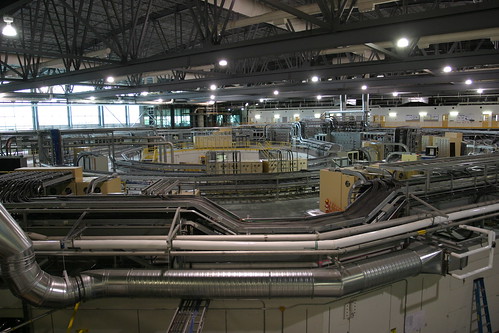Hi internet!
I have a favour to ask of ye: our group has recently become rather... largeish. I'd guess we total about 12-16 people including students, postdocs, undergrads, etc. I'm looking to find ways to improve our weekly group meetings, so they stay well away from the "herding cats" side of the group meeting spectrum and focus on the "informative and efficient" side.
So! In order to facilitate this, I was hoping I could solicit the input of the mighty internet. What has worked for you in group meetings? What drives you nuts? If you could change any one thing about group meeting, what would it be?
As an enticement to get those creative juices flowing, anyone who emails or comments me their input will get a postcard featuring the beautiful and mountainous mountains of Alberta! I might post the responses (assuming I get any) with your permission, anonymously if desired. My email address is joel dot kelly at ualberta dot ca.
(I would have offered free Canadian donuts or beer, but I have my doubts about shipping those without getting stale.)
Thursday, January 28, 2010
calling all group meetings
Tags
group meetings
Subscribe to:
Post Comments (Atom)

6 comments:
Group meeting in my undergrad group (7-8 people): hell. Scheduled in advance. One lit presentation (wherein we tear the paper apart)--this was useful, kinda. One 20-minute presentation (then we go back and tear IT apart slide by slide)--this was AWFUL. One research presentation (wherein we discussed problems and offered solutions)--this was the only good part.
Current grad group (12-14 people): not bad. Everyone brings slides of what they've done for the past week and some plans for the current week (meetings are Mondays). If the boss calls you out, you present. Relatively quick and painless, often quite constructive and helpful, but sucks when your data are less than awesome and the boss is in a bad mood. Downside: often a little light on background and basics--fine for established members, less than ideal for beginners.
Current joint supergroup meeting (~50 people): dinner and science. Scheduled WAY in advance. Each week, someone gives about a 45-minute talk about their project, including background and current results. That person is required to supply the group with food and beer. This is good for new people since there is usually some context to the talk, good for established members because there are a wide variety of topics within the supergroup and you get exposed to new science. Generally good-natured atmosphere, but unhelpful for discussing current research issues for other members. And, uh, free beer.
Someone else's group meeting that I occasionally attend (8-10 people): OMG IDEAS EVERYWHERE! Presentations scheduled somewhat in advance. Occasional lit talks, frequent research updates, some more thorough presentations. Frequently interrupted with stories and tangential information from the boss--but this is not a bad thing. This is highly useful information that I may not learn elsewhere and is the reason I show up even though it's not my group. Very constructive atmosphere, often focused on getting new people up to speed and offering suggestions to established members. Downside: often runs a little long.
so awesome. thanks for the amazingly speedy response jes!
The biggest issue with working in a large group is not getting lost in the fray when you're starting out as a grad student and establishing your work and your project. Communication with your PI is crucial then, so if the group gets large, a balance of formal talks and individualized attention leads to the best results.
I work in a big group (20+ people) and our group meetings focus on the ability to clearly present results. One person goes per week and has however much time they need (up to 90 minutes) to discuss their project- background, inspiration, results, future work. Since one person goes once every six months or so, it can be easy to fill up those 90 minutes. For grad students who haven't done their prelim/oral exam yet, it's a chance to really show off your abilities as an independent scientist- and dangle your feet over the coals of the nastiest critics around (ie. yours truly). But it can get tedious if people who aren't so good at giving talks, or are stupid, are presenting that day. The good group meetings go fast regardless of how long they last. We bring snacks. Baked goods are typical. Usually the person who presented the week before is responsible for snacks.
Literature presentations are giant fucking wastes of time. Rip papers apart on your own time. If you don't know how, learn. Or get out of grad school.
I think with large groups, more frequent subgroup meetings are necessary to discuss results on a more regular basis with the PI and senior members of your project. This is especially important for junior members. We don't do this- we send monthly reports to our PI and he reads and comments on them. Same idea, really. There has to be a balance of to guarantee regular communication, so it's important to make sure that however you do your group meetings, you still have the requisite "face time" with your boss.
Well, I've never been in a big group, so I don't have much experience, and my ideas have already been said, but I'll reiterate them for the hell of it.
Definitely all about scheduling formal talks, and ditching the literature.
In our group we're all assigned a few journals to go through, and then in group meeting we mention any relevant articles to each other. You don't need group meeting for this; I have pretty much all relevant journals in my RSS, and I just mail them to group members as I seen anything relevant. Lit seminars are useful, but not compared to everything else.
For research, schedule 1-2 people per week to give a formal talk, then leave a little bit of time for anyone to bring up anything that anyone wants input from everyone else on, but you have to limit that time.
With that big a group you definitely need to schedule individual meeting times with the PI, or at least the managing postdoc depending on how the group is organized.
Hope some of it helps!
Oh, the other reason I meant to say that formal research presentations are nice, is that way you already have presentations somewhat prepared when it comes time for a meeting or conference.
Thanks Will! Thanks Aaron! You guys rock so hard it hurts my face off.
Post a Comment